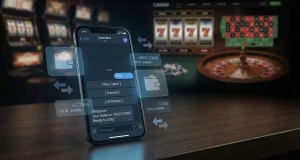Why Trading Your Casino Comps Might Pay Off More Than You Think

We all love freebies! Do you know how many free drinks I’ve gotten at Starbucks with their rewards program? Let’s just say I’m over-caffeinated and dehydrated.
Casinos do the same thing with their rewards programs, only instead of espresso or one of those weird-looking pink drinks, you get things like free rooms. Or dinners. You know, casino comps!
You sign up for a player’s where you play the most, and the comps start coming. Sounds good! But there are a lot of players who claim those comps and then don’t use them, which is nuts. Not only are they missing out on food vouchers and hotel nights, but they might not know that they could be even more valuable if you get a little creative.
How can you get creative and leverage your comps like cash? You can hit up gaming forums, social media groups, and apps where players trade, swap, or strategize about comps.
We are gonna tell you how to think of your comps as currency, and how to trade, optimize, or even re-use them so you get the most value from your casino activity! Let’s get comping.
What Are Casino Comps, Really?
“Comps” is short for complimentary rewards, and they are basically freebies that casinos hand out as a little “thank you” for playing.
On the basic end of the comp systems, you’ve got things like the following:
- Free slot play credits
- Drink vouchers or complimentary cocktails
- Buffet or casual dining comps
- Discounted or comped hotel stays
And when you move up the loyalty ladder, or if you show you’re willing to lose enough money, you start to unlock the better stuff:
- Tickets to big-name concerts or shows
- Free flights or airport transfers
- Room upgrades and luxury suites
- Spa treatments, golf rounds, pool cabanas
- Dedicated VIP host services, limo rides, and private gaming areas
Casinos can give you anything from a free breakfast to a full-blown weekend getaway. What you get depends on how much value they think you’re bringing to the casino table.
How Comps Are Earned
So, comps aren’t gifts; they’re calculated investments. The casino isn’t giving you free stuff because they like you. Nope, they’re giving it to you because they expect to win your money.
Your comps are based on something called theoretical loss (or “theo,” as regulars call it). That’s the casino’s estimate of how much money you’re expected to lose, based on these things:
- The game you’re playing (slots have higher house edges than blackjack)
- Your average bet size
- How long have you been playing?
- And in some cases, how fast you play
The formula looks something like this:
Theoretical loss = total amount wagered × house edge × time played
So if you’re betting $10 per hand at blackjack for three hours, the casino does the math and estimates your expected loss. Maybe it’s $150. Based on that, they might give you comps worth $10 to $20. That’s your “comp value.”
Loyalty tiers also come into play. Most casinos have a rewards program (MGM Rewards, Caesars Rewards, etc.) that tracks your gambling and assigns you a tier, like Bronze, Silver, Gold, Diamond, and so on. The higher your tier? The better your comps. You’ll get more offers, better rooms, priority access to events, and maybe a dedicated host who can customize your perks.
Why Casinos Bother with Comps
Comps aren’t generous entities, so comps have one purpose: they are retention tools. Casinos use them to keep you loyal, keep you playing, and make you feel like a “valued guest” even when you’re handing them thousands of dollars. And it works! Players are much more likely to return to a property where they feel rewarded, even if that reward is a modest room discount or a couple of drink tickets.
There’s also psychology at play. Once you get something “for free,” you’re more inclined to keep gambling because it feels like you’re being paid to play. It’s the sunk-cost fallacy in action; you’ve already invested time and money to earn that comp, so you might as well keep going! And that’s exactly what the casino wants.

Most comps return only a small percentage of your actual loss. A typical slot player might get comps worth 0.1% to 0.5% of their total coin-in. That means if you run $10,000 through a slot machine, you’re maybe getting $10–50 in comp value, depending on the casino’s generosity. High rollers fare better, but even then, the casino always comes out ahead.
Comps Are a Game within the Game
Once you grasp how comps work, you start to realize that they’re not just perks; they’re a vital part of the business model. And if you’re smart, you can treat them like another bankroll: not in dollars, but in value. If you’re a mid-level player or someone just visiting for the weekend, there are ways to stretch those freebies beyond what they’re “worth” on paper. But to do that, you’ve got to think of comps less like a reward and more like a currency!
Why Most Players Undervalue Their Comps
Comps feel like they’re a bonus. That’s both the hook and the trap. Because you didn’t pay for them, it isn’t hard to treat them like throwaway perks instead of something that has real value. That mindset? It’s what casinos are banking on.
‘It’s Free, So Who Cares?’
This is how most players think: “Hey, it’s free, so I might as well use it.” That kind of logic turns into a lot of low-return redemptions. You’ve probably witnessed it (or done it yourself); someone blows a $20 free play voucher on a penny slot machine that barely pays back anything. Or they cash in a $40 meal comp at a cafeteria-style buffet instead of waiting to use it at the steakhouse later that evening. The result? The player gets some value, but it’s nowhere near what they could have gotten with a little patience or planning.

Then there’s the gift shop trap. Casinos love it when people burn food or resort credits on overpriced souvenirs or marked-up snacks. A $25 comp doesn’t go far when you’re buying a $7 candy bar or a logo hoodie that would be half the price anywhere else. Just because a comp can be used doesn’t mean it should be used. Capiche?
Letting Value Expire
The other way players lose out is by doing absolutely nothing. Free rooms go unbooked. Show tickets expire before anyone even checks who the headliner is. Free play coupons sit in drawers, untouched. And casinos are not gonna chase you down to remind you; they’re more than happy to let the offer vanish if you’re not watching your email or loyalty account.
A lot of missed comps come from confusion around blackout dates, expiration windows, or vague wording on offers. But most often, it’s a lack of planning. Maybe you meant to take that comped two-night stay, but the dates didn’t line up, or you figured you’d get around to it “later.” That later never came, and the comp disappeared.
Not All Redemptions Are the Same
This next part is the thing that a lot of casual players miss: not all comp uses give you the same value. That $50 resort credit? You could use it on two overpriced drinks and a bag of chips… or you could save it for a fancy meal. A comped suite during off-peak season might be worth $100. But if you bank it and use it over New Year’s weekend? It might just cover a $450 room rate. That’s real leverage.
You have to understand that there is a hidden value in almost every comp. If you wouldn’t normally pay cash for something, don’t waste your comps on it just because it’s “free.”
Free play, especially, should be treated super strategically. Use it on games with better return-to-player (RTP) percentages, not whatever happens to be the closest game to the bar.
Act Like You’re Spending Cash
This is a simple rule: treat comps like they’re money. If you wouldn’t pay $50 for a generic sweatshirt, don’t use a $50 in comp credit on one! If you wouldn’t book a room during the week for $80 out of pocket, but you would for $300 on a weekend, use the comp then. Just because the casino handed you the coupon in no way means that you owe them your loyalty.
Start thinking about comps as currency with fluctuating value, depending on how and when you use them. All of a sudden, that dusty “free” dinner becomes something worth timing and planning. And instead of being just another player eating at the buffet out of habit, you’re someone who’s getting real value out of the system.
Trading and Selling Casino Comps: Is It Legal or Allowed?
Ok, onto swapping and selling casino comps. Is it legal? Merely frowned upon? Eh, it’s complicated. Trading casino comps isn’t encouraged, but it’s not outright illegal either. It’s sort of like jaywalking. Unless you do it in front of a cop, most of the time? No one cares. But that could change depending on how you do it and who knows about it.
If you dig through the fine print of your player’s club agreement, you’ll find language saying comps are “non-transferable” or “intended for use by the original recipient.” That’s the corporate line. But in practice, casinos aren’t monitoring every single meal voucher or hotel booking to make sure you are the one who is using it.
Casinos care about play, not paperwork. As long as someone’s putting money into the machines or onto the tables, they’re not going to raise an eyebrow if your cousin checks into a comped room on your account. As long as your cousin is spending money? You’re good.
But things get a little touchier when money changes hands. If you start openly selling comps, like with Craigslist ads or public Facebook posts, you are in danger of triggering internal flags. Even if what you’re doing isn’t technically illegal, it can violate the terms of service with the casino. And if you do it often or blatantly enough, they can and will shut you down.
That being said, a sort of underground marketplace exists, and it’s really active. Long-running forums like VegasMessageBoard or specialized Facebook groups have entire threads dedicated to players who swap offers. It’s not unusual to see posts like, “Have extra show tickets for Friday, looking to trade for dining credit,” or “Can’t use my comped room this weekend, does anyone want to book under my name?”
They aren’t shady deals made on dark street corners. They’re regular gamblers looking to squeeze more out of what they’ve earned, and they help each other out along the way. Some trades are just favors between friends. Others are a barter: you give me your show tickets, I’ll hook you up with a weekend room next month. Everyone walks away happy, and the casino never knows. And if they do, it doesn’t seem like they care.
Rooms are the most commonly traded comp, because they’re really easy to hand off. You just call in, make a reservation, and list someone else as the guest. As long as your name is on file and you meet whatever ID or check-in requirement they ask, you’re good. Some players do this for family and friends all the time, especially if they don’t plan on using the room themselves.
Show tickets and spa credits can also be passed along, although they’re a little harder to offload since they’re l tied to specific dates or names. That’s where timing and trust come in; you need to plan ahead and, ideally, trade with people you know or who have a reputation in the forums.
Selling is where it gets really risky. You might think selling a $150 comped show ticket for $60 is no biggie. But if the casino finds out, and they do monitor secondary markets now and then, they can label you a rules violator. It could start with getting “no-mailed” (cut off from future comp offers) or being downgraded in your loyalty tier. Do it enough and they might shut your account or, in rare cases, 86 you completely.
Look, casinos aren’t scouring every Facebook comment or Reddit post. They’re too busy tracking bigger trends and high-volume players. A casual comp trade now and then won’t move the needle. The line gets crossed when someone turns it into a side hustle, and they’re flipping rooms every weekend, booking shows for strangers, or running a comp resale account.
Don’t get greedy. If you’re swapping or gifting a comp here and there, you’re unlikely to draw attention. But once money changes hands or patterns emerge? You’re in the danger zone.
Best Ways to Trade or Repurpose Casino Comps for Higher Value
Once you realize that you don’t have to use you at a buffet or for an off-season hotel night, the game changes. When they’re used the right way? Basic perks can become part of something bigger! It could be a better trip, a shared deal with a friend, or a negotiation chip with a host. You don’t have to be a high roller to get creative.
1. Direct Trades with Other Players
Think of comps as bargaining chips. You’ve got a comped hotel stay, and someone else has a stack of food credits they won’t use. Maybe you’re going to town for a show, and they’re coming for poker. This is where the bartering starts.
In forums, Facebook groups, and on Discord servers, players arrange low-key trades all the time. You’ll see posts like the following:
- “I’ve got three nights comped at MGM, and I’m looking to swap for a Caesars Palace food credit or show ticket.”
- “Anyone want a pool cabana credit in exchange for dinner at Cosmo?”

And they don’t have to be dollar-for-dollar. Maybe someone values a prime steakhouse meal over a basic hotel room. The point is to match interest, not numbers. The informal trades fly under the radar because they’re not public sales, and usually, no cash is involved.
Just be smart about who you’re dealing with. If you’re trading with strangers online, use groups that vet members or have reputation systems. And keep it simple; no complex chains of trades that fall apart when one person flakes.
2. Share Comps with Friends and Family
This one’s underrated and totally legal! At most casinos, you’re allowed to let someone else check in under your comped room, as long as you set it up properly. You don’t even have to be there.
Let’s say you scored a two-night comp at a Vegas property but can’t make the trip. Your sister is going and needs a place to stay. You call the hotel, book the comp, and list them as the secondary guest. Easy peasy!
You don’t even have to trade anything in return, although some people do turn it into a longer-term exchange:
- “Use my comped room this trip, and I’ll take your extra show tickets next time.”
- “You use my food credit now, I get first dibs on your freeplay next time.”
Players who travel as a group will pool their comps; one person books the suite, another brings the show tickets, and a third takes care of the eats. That turns a few scattered offers into a full weekend setup. Casinos don’t mind as long as the comps get used and at least one person is playing under their rewards account.
3. Work with a Host or Third-Party Concierge
If you’ve built any kind of status, and no, you don’t have to be an elite high roller, this is where things can get interesting. Casino hosts can do way more than send you birthday cards. A good host will reshuffle comps to suit your plans if you ask the right way.
If your email offer includes a basic room, some freeplay, and a buffet credit, but you’d rather skip the buffet and stay in a suite? Ask! The host may be able to repackage the offer and cut the food credit, and throw in a nicer room or a show ticket instead.
Third-party concierge services do something similar, especially for cruise casinos and destination resorts. Sites like URComped work with smaller properties to hook players up with better deals in exchange for verified gambling activity. They’ll usually combine your comps into bundles, like room plus airfare reimbursement or show tickets stacked with extra freeplay, if you agree to give them a certain amount of play while you’re there.
Just don’t expect miracles if you’re betting $10 per day! But know that moderate players can get upgrades or custom packages if they know who to ask and when.
4. Time It Right
A comp is worth exactly what it saves you. And what it saves you depends almost entirely on timing.
That “free” hotel room isn’t the same value every week. In the middle of July, midweek, when rooms go for $85? Not that impressive. But during a holiday weekend when room rates hit $400+? That’s a deal.
Same idea with food credits or show tickets. Using a dining comp on Tuesday at 3 p.m. gets you lunch. Using it Friday night at the same restaurant gets you steak and wine, and you’ll still be covered. Show tickets? Don’t waste your comp on an off-night with an empty theater. Save it for when someone you really want to see is performing!

If your comps have flexible dates, stash them until they pack the most punch. Players who travel to Vegas for fights, major poker series, or holiday weekends can turn average comps into high-value perks just by holding off.
5. Use Comps at Other Properties
This one’s called comp matching or comp shopping. It’s not really advertised, but hosts at competing casinos will sometimes offer you perks if they know you’ve already got an offer from somewhere else.
If you’ve got two comped nights at Caesars and you’re thinking about trying Wynn? Drop the Caesars offer into conversation with a Wynn host. In some cases, they’ll match or beat it to lure you over. This doesn’t always work at low tiers, but once you hit mid-level status or show decent play history, casinos will fight for you.
Even without a formal match, knowing what comps you’re getting from one chain can give you leverage to negotiate better terms at another. You’re not beholden to one casino, so use what you’ve earned to open up other options.
Tools & Communities That Help You Trade or Optimize Comps
If you’re still relying only on casino emails and hoping a decent offer shows up, you’re missing out on the good stuff. There’s a whole subculture of players who trade tips, post comps, compare offers, and work the system better than most hosts do. Plugging into the below communities can change how you play and how much you get back!
Message Boards That Know of What They Speak
Old-school forums are still one of the most underrated resources for comp strategy, and these are the best:
- VegasMessageBoard: This place is a goldmine for comp-specific threads. Players swap real stories about what worked, what didn’t, and what they negotiated behind the scenes. If you want to know if a casino will let your spouse use your free room while you’re out of town? Ten people on here have already done it and reported back.
- Wizard of Vegas: This one is more analytical, but the comp math and strategy threads can be super helpful if you’re trying to figure out how to stretch your play into better value.
- TripAdvisor (Vegas and Atlantic City forums): These can be hit or miss, but if you dig through them, you’ll find lots of trip reports, offer breakdowns, and people exchanging advice about how they stacked comps across multiple casinos during a single trip.
Lurking is free! But posting can get you answers to questions that you didn’t even think to ask.
Reddit Threads, Real Experiences
Reddit isn’t only for memes and conspiracy theories; there are entire subreddits where players talk comp strategy in between bragging about their wins.
- r/lasvegas: This is one of the best subs for comp discussion, especially if you’re booking a trip and want to see how others used theirs. You’ll find players comparing room upgrades, explaining which properties are cheap or stingy, and screenshots of offers so others can match or beat them elsewhere.
- r/gambling: A bit broader, but really helpful if you’re playing across different markets. There are plenty of crossover tips for Vegas, tribal casinos, and riverboats.
Not every comment is worthwhile, but you’ll definitely get a good sense of what’s possible and how much negotiating power you have.
Apps That Convert Time-Wasters Into Real Perks
Of course, there’s an app for this! Dedicated mobile apps hand out comps, and no, it’s not a scam.
- myVEGAS Slots: You play free slot games on your phone, rack up loyalty points, and cash them in for things like buffet passes, show tickets, and free room nights at MGM properties. It’s time-consuming, yes, but if you’re already scrolling your phone, you might as well earn a buffet while you’re at it.
- URComped: The more serious players use this one. You link your gambling profile (or prove your level of play), and they connect you with offers from cruise lines, off-Strip casinos, or regional properties that are looking for new blood. Their concierge team does the outreach for you, and in return, you agree to gamble at a certain level once you arrive. For mid-tier players trying to level up, this will unlock better rooms, premium comps, and VIP treatment you’d never get just walking in cold.
- Comped Travel Services and other similar groups: These are the niche outfits that help bundle offers, especially for multi-property trips. They’re like travel agents who specialize in getting the most out of your casino activity. They’re not for everyone, but if you’re planning a longer trip or hitting multiple cities, it might be worth looking into.
VIP Groups and Insider Circles
There are private Discord servers, Facebook groups, and invite-only Telegram chats where high-volume players trade offers, coordinate trips, and share access to hosts or comp codes. You won’t find these on a Google search.
But once you start hanging around message boards, sharing useful info, or even just asking the right questions in public threads, you can get invited in. These are the places where you’ll see players posting things like:
- “Just got offered 3 nights at Bellagio + $250 resort credit. Does anyone want to stack a spa comp on this?”
- “Looking to split a suite comp in December, I’ve got the host contact and can book.”
These aren’t sprawling operations; they’re usually just a handful of players who know how to get the most out of the system and enjoy helping each other do the same.
You Don’t Need to Be a High Roller to Plug In
That’s the biggest misconception. These communities aren’t just for $100-a-hand blackjack players. If you gamble semi-regularly, keep records, and have a player’s card or two, you’ve already got something to work with. The key is knowing where the value lives, and the above tools and communities will help you spot it faster than the average player walking in off the street.
Four High-Stakes Strategies: How Serious Players Extract Maximum Comp Value
For the casual gamblers out there, comps are a nice perk: a free buffet here, a discounted room there. But for serious players? They’re a second currency. The best ones use comps the way others use points, miles, or frequent flyer status: they track them, trade them, and stack them in ways that would make a loyalty program executive have a panic attack.
Trading Like a Pro
Let’s begin with what this looks like in practice. One high-volume player has a few comped nights at a Strip property they’re not using. Instead of letting them expire, they reach out to another gambler, like someone heading to town for a poker series, who has $300 in unused resort credit at another property. They do a straight-up exchange: the poker player gets the room, the high-roller gets steak dinners and their drinks comped on the next trip. Nobody pays a cent. The casinos don’t care.
It isn’t some secret underground Fight Club! It’s just smart, targeted bartering. And if you’re playing enough to get suite offers, flight credits, or line-cutting privileges, you’ve got more negotiating power than you think. In the hands of a player who knows what to do with them, comps aren’t solely perks; they’re also decent leverage.
Cross-Chain Stacking: When the Host Turns Middleman
The best in the game know how to get properties to compete for their action. You’ve got MGM status and a fat comp offer? Drop that info on a Caesars host. In most cases, they’ll mirror it or try to beat it to poach your play. That means stacking multiple offers across the Strip, booking one room at Caesars and another at The Venetian, and deciding where you’ll give your play based on who steps up their package.
It isn’t a one-time trick; this is a full-on system. A serious player will book at multiple properties over a three-day trip and bounce between them, keeping all their hosts happy while collecting perks on both ends. It’s work, yes. But the payoff is upgraded suites, spa days, limo rides, and layered freeplay that can add up to hundreds or thousands, without having to dip into your bankroll.
Using Comps as Relationship Capital
Not all comp value is transactional. Sometimes it’s about influence. High rollers build relationships with other gamblers, dealers, and hosts, and comps are a part of that social currency.
You’ve got extra buffet comps you’re not using? Give them to a host, a pit boss, or a dealer you’ve built up a rapport with. That kind of goodwill tends to come back around. Players with deep networks will offer extra show tickets to another gambler they know is coming into town, or pick up dinner for someone they’ve traded with before. The next time they need a favor, like an early check-in, late checkout, line bypass, or a better table, they’re more likely to get it.
This kind of comp use will never show up in your rewards balance, but it is important. Hosts remember the players who treat comps like something more than free handouts. They remember who tips well, who shares extras, and who brings in play from others. And that’s how doors open that aren’t listed on any offer sheet.
Betting Smarter, Not Bigger
The elite players also know something else: the highest comp earners aren’t always the biggest losers. Most of them are edge-seekers who’ve gamed the system just enough to stay profitable, or at least close to it, while still racking up tier points.
They’ll play the games with a high theoretical loss to boost comp offers for a short burst, then switch to lower-risk play to keep their bankroll intact. They’ll hit a new property with moderate action, take the initial comp bait, and then negotiate future visits based on “potential” play. Some go as far as planning entire trips around where they can stack the most value from overlapping offers, pulling in free rooms from one casino and meal credits from another, all while keeping their spending low.
They’re not gambling for comps, but they’re absolutely making every comp earn its place in their roster.
Four Risks and Pitfalls to Avoid
Getting creative with your comps is smart. Treating them like free money, bulletproof perks, or side income? That’s not so smart! Casinos aren’t naive, and they do track your habits, compare your comps to your play, and notice when things don’t add up. Don’t make these rookie comp mistakes!
Bans and Ghosted Accounts
You don’t have to get kicked out in dramatic fashion to get cut off. The first sign you’ve crossed a line is subtle: your offers get weaker. No more freeplay. No more comped suites. Eventually, there’s nothing at all.
This happens when your account starts raising red flags. Maybe you’re booking comped rooms without giving the casino any meaningful play during the stay. Maybe your loyalty card hasn’t been used in months, but someone else always seems to be checking into rooms under your name. Whatever the pattern is, if it doesn’t match expected gambling behavior? Your account can get sidelined. Hosts won’t return your calls. Emails go unanswered. You’re not banned, but you’re not getting anything either.
Selling Comps Isn’t Smart
There are players who try to flip their comps for cash. They are selling show tickets, spa credits, or extra rooms online. It seems harmless, especially if you’re just trying to unload something you won’t use. But once a casino spots that behavior, your account is now considered a liability.
The risk doesn’t always come from the sale itself; it comes from how public or frequent it becomes. Marketplaces like Craigslist or resale forums are easy targets for casino surveillance teams. If your name, rewards number, or booking activity ends up linked to reselling, they don’t need to prove you profited. They just pull your offers and blacklist your account from future promotions.
And they won’t warn you. There’s no email saying “you’ve been flagged.” You just wake up one day and realize you haven’t gotten a comp offer.
Gambling for the Perks, Not the Win
The biggest trap isn’t resale. No, that would be an obsession with comps. Some players will chase them like they do frequent flyer miles, forgetting that the value they’re earning doesn’t come anywhere close to what they’re spending.
A player will push past their limit just to hit a loyalty tier. Or they double their bets at midnight because they’re “this close” to qualifying for next month’s free room. The irony isn’t lost on us; spending $500 just to qualify for a $99 buffet or a mid-week suite that they didn’t really want in the first place.
Casinos reward volume, not skill. So if you’re chasing comps without a plan, it’s easy to overplay and convince yourself you’re “getting it back” through perks. You’re not. The math always favors the house. That comped dinner might feel like it’s a win, but if you had to burn through two hours of -EV slots to earn it, it’s a loss with a cherry on top.
Getting Too Visible
The more you treat comps like they’re tradable goods? The more you want to stay under the radar. That means no public posts advertising what you’re “offering” to strangers. No mass emails. No TikTok videos bragging about how you “hacked” the system.
Casinos don’t crack down on low-key trades between friends. But they will react when it looks like someone’s trying to turn their comps into a marketplace. Even if you’re operating in a legal gray zone, once you become a pattern, the casino’s response is simple: they cut off the perks. Sometimes the card. And occasionally? Entry altogether.
Final Thoughts: Your Casino Comps Are Currency, So Treat Them Like It
If you’ve been thinking about comps as random perks or nice little freebies, it’s time to recalibrate your noggin. Every comp you earn represents money that the casino expects to make off of you. That doesn’t mean you shouldn’t take advantage of it, but it does mean you should think like the house does.
Comps aren’t given because a casino cares about you. They’re doled out for loyalty, control, and pushing you to give the casino one more spin, one more bet, one more night. But if you treat those offers strategically by trading them, timing them, or looping in friends, you can play the house instead of the house playing you. Comps will become useful tools to lower your costs, level up your trips, and get more out of your play without spending more than you need to!
Even low-tier players can punch above their weight here. You don’t need to be dropping five figures in the high-limit room to make comps work in your favor. You just have to understand what they’re worth, where they go to waste, and how to extract more value before they expire, get downgraded, or fall through the cracks.
Most players leave money on the table, but you don’t have to be one of them!
Conclusion: You Can Turn Your Freebies Into Wins
Okay, so now that we’re all up to speed with how you can trade your casino comps and why it pays off, let’s do a recap of everything we learned!
- Comps aren’t worthless spam or junk mail; they have real value if you know you use them.
- Trading, sharing, or repurposing comps can turn throwaway perks into hotel nights, dinners, or upgraded trips.
- Don’t overspend chasing comps! Value is not value if you have to lose three times that amount to earn it.
- Stay off the radar. Down-low trades are fine. Public resale? That’ll get you clipped.
- Think long-term. Use comps to build relationships, stretch your bankroll, and negotiate better offers later on.
Comps can be a part of your advantage, but only if you treat them like they matter, and they definitely do! The house is literally counting on you wasting them. Don’t play into their hands.

Matthew specializes in writing our gambling app review content, spending days testing out sportsbooks and online casinos to get intimate with these platforms and what they offer. He’s also a blog contributor, creating guides on increasing your odds of winning against the house by playing table games, managing your bankroll responsibly, and choosing the slot machines with the best return-to-player rates.








